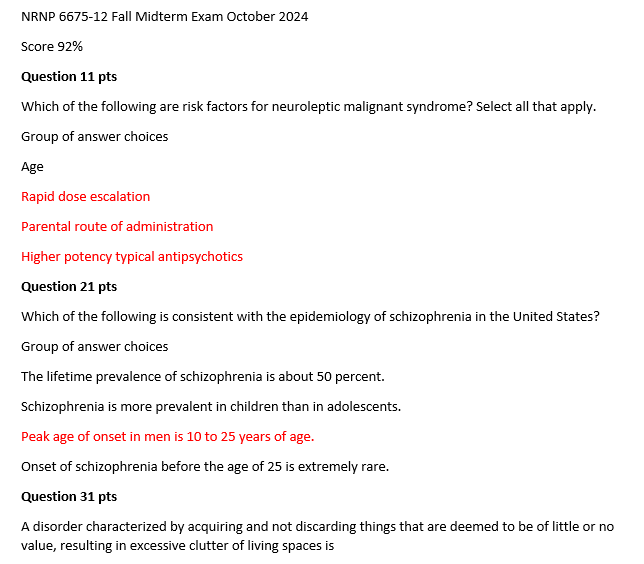6675-12 multiple choice questions with answers
Question 11 pts
Which of the following are risk factors for neuroleptic malignant syndrome? Select all that apply.
Group of answer choices
Age
Rapid dose escalation
Parental route of administration
Higher potency typical antipsychotics
Question 21 pts
Which of the following is consistent with the epidemiology of schizophrenia in the United States?
Group of answer choices
The lifetime prevalence of schizophrenia is about 50 percent.
Schizophrenia is more prevalent in children than in adolescents.
Peak age of onset in men is 10 to 25 years of age.
Onset of schizophrenia before the age of 25 is extremely rare.
Question 31 pts
A disorder characterized by acquiring and not discarding things that are deemed to be of little or no value, resulting in excessive clutter of living spaces is
Group of answer choices
Specific Phobia
Trichotillomania
Hoarding Disorder
Obsessive-Compulsive Disorder
Question 41 pts
Which of the following is not a common physical effect of cannabis?
Group of answer choices
Mild tachycardia
Mild bradycardia
Orthostatic hypotension
Dilation of the conjunctival blood vessels
Question 51 pts
A patient presents with delusions, disorganized thoughts, and speech, with poor self-care, all of which have persisted for the past 7 months. The APRN realizes this presentation is consistent with which of the following diagnoses?
Group of answer choices
Schizophrenia
Schizophreniform disorder
Brief psychotic disorder
Delusional disorder
Question 61 pts
A condition in which an enzymatic defect in the production of adrenal cortisol, beginning prenatally, leads to overproduction of adrenal androgens and, when the chromosomes are XX, virilization of the female fetus, is known as which of the following?
Group of answer choices
Congenital adrenal hyperplasia
Androgen insensitivity syndrome
Turner’s syndrome
5-α-reductase deficiency
Question 71 pts
Which of the following are consistent with current data related to the prevalence of drinking alcohol?
Group of answer choices
Men and women with higher education and income are less likely to drink alcohol.
Men and women with higher education and income are more likely to drink alcohol.
Men and women with lower education and higher income are more likely to drink alcohol.
Education and income are not a factor in prevalence of drinking alcohol.
Question 81 pts
Researchers have identified particular neurotransmitters or neurotransmitter receptors involved with most substances of abuse except for which of the following?
Group of answer choices
Alcohol
Opioids
Amphetamines
Cocaine
Question 91 pts
Which of the following neurotransmitters increases libido?
Group of answer choices
GABA
Serotonin
Oxytocin
Dopamine
Question 101 pts
Which of the following antipsychotic medications has been shown to shorten QTc?
Group of answer choices
Aripiprazole
Risperidone
Quetiapine
Haloperidol
Question 111 pts
Which of the following neurological symptoms are consistent with inhalant use?
Group of answer choices
Sensory illusions, distortions of body size
Fearfulness, auditory and visual hallucinations
Irritability, emotional lability, euphoria
Slurred speech, decreased rate of speech, ataxia
Question 121 pts
The phenomenon in which, after repeated administration, a given dose of drug produces a decreased effect is known as which of the following?
Group of answer choices
Tolerance
Cross-tolerance
Addiction
Intoxication
Question 131 pts
Neurochemical or neurophysiologic changes in the body that result from the repeated administration of a drug is known as which of the following?
Group of answer choices
Cross-tolerance
Neurotransformation
Neuroadaptation
Neurocognitive adjustment
Question 141 pts
When a manic or depressive syndrome develops concurrently with the major symptoms of schizophrenia, the appropriate diagnosis would be which of the following?
Group of answer choices
Bipolar schizophrenia
Mood disorder with psychosis
Schizoaffective disorder
Bipolar disorder with psychosis
Question 151 pts
Preoccupation with an imagined defect in appearance that causes clinically significant distress or impairment in important areas of functioning is consistent with which of the following disorders?
Group of answer choices
Anorexia
Body Dysmorphic Disorder
Obsessive-Compulsive Disorder
Dissociative Disorder

Reviews
There are no reviews yet.